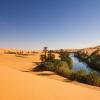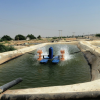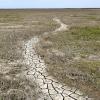Introduction
Water has long been at the center of conflict in the northern regions of Mali, in West Africa. This vast water-scarce area spans 827,000 square kilometers (320,000 square miles) between the Sahara in the north and the Sahel in the south – in total, about two-thirds of the national territory. “One can travel tens or even hundreds of kilometers without seeing a single water facility. And when there is water, it is not of good quality,” says Almahady Cissé, the head of Cri de Cœur, a local NGO working in northern Mali.
BBC reports that as the Sahara Desert advances south, finding water is becoming increasingly urgent to ease the strain on local community tensions. Water is the source of many conflicts in across the Sahara, within nations and between them. In Mali, local people and NGOs are digging a network of micro-wells in an effort to reduce tensions, provide for local communities and keep up with shifting populations from internal displacement.
The causes of the conflict in Mali are complex, but one thing is certain: water shortages raise tensions, and in turn tensions make access to water more difficult. In the north of the country, economic activities put additional pressure on water shortages, straining tensions. “In these regions, people are either a farmer in a village, or a nomadic herder,” says Cissé. “So conflicts arise around the water plants between these community groups.” A lack of water can lead to brawls, sometimes resulting in loss of life.
To ameliorate the problems, NGOs have supported communities to install shallow handpumps. A manual pump installed in Dialangou village allows residents to avoid having to use water from the pond near the village, whose troubled waters were a source of major health problems, including diarrhoeal diseases such as cholera and schistosomiasis.
So far the micro-wells seem to be working. The water from the Dialangou borehole was analysed by the Mopti Regional Water Laboratory this year and the results showed that water met the required quality standards in Mali.
A total of 161 boreholes have now been drilled in the Mopti region using the manual technique. But the scale of the challenge remaining is still huge. Nationally, almost a quarter of the population does not have access to clean water, according to the international NGO Water Aid.
Local authorities, communities and NGOs working to create micro-wells are up against constant challenges. The more an area is in need of a well, the greater local tensions are likely to be, making its construction more difficult. “In some areas, it is impossible to do anything given the insecurity that reigns,” says Cissé.










Trending Discussions
From around the site...
“Absolutely interested! I'll connect via email to discuss reviewing and enhancing the Economic Analysis of Climate...”
Adaptation-related events at COP28 (all available to follow/stream online)
“Please check out these adaptation-related events taking place at COP28 - all available online (some in person too if...”
Shining a light for biodiversity – four perspectives to the life that sustains us. Four hybrid sessions.
“30 November to 19 December 2023 - Four Sessions Introduction The SDC Cluster Green is happy to invite you to the...”